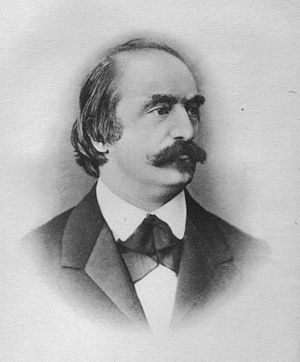Music criticism facts for kids
Music criticism is when people share their thoughts and opinions about music. This can be about how good a song, a piece of music, or even a whole style of music is. It's also often about reviewing live music performances, like concerts or operas.

Contents
Why Music Criticism Can Be Tricky
Music can be one of the hardest art forms to criticize. Unlike a painting or a book, music doesn't use words or pictures that we can easily connect to everyday life. For example, the note 'C' doesn't mean "breakfast" or "love."
Music is also performed live, which means it's created fresh every time. So, a critic might review the written music itself (the score) or how well it was played by the musicians. Music also unfolds over time, with parts repeating or developing. This means things like balance and contrast are very important.
Because there aren't strict rules for what makes music "good," music criticism often depends a lot on the critic's own feelings and ideas. It's very personal!
A Look Back: History of Music Criticism
Early Days of Music Criticism
People have been talking and writing about music for a very long time. Even ancient writers like Plato mentioned music in their works. In the Middle Ages, music theorists also wrote about music.
In the late 1700s, London had many concerts. This helped create the idea of arts criticism as we know it today. However, the first magazines just for music criticism appeared in Germany. One example was Der getreue Music-Meister (1728) by Georg Philipp Telemann.
In France, a big debate about opera styles in the 1750s led to many essays about music. The English composer Charles Avison wrote the first book on music criticism in English in 1752. Until the late 1700s, critics mostly focused on vocal music, like opera. They thought vocal music was the most important because they knew what the words were expressing.
The Romantic Era and New Ideas
The late 1700s brought big changes. Rich people (aristocrats) stopped being the main supporters of music. Instead, the growing middle class became more important. Also, the Romanticism movement began in the arts.
These changes affected music criticism. Critics started writing for a wider audience, not just experts. They began to explore new ideas about music, especially instrumental music. E. T. A. Hoffmann, a famous writer, noted in 1809 that instrumental music, especially the symphony, had become very important.
Concert programs also started to feature more "classical" music from the past. This meant living composers were now competing with famous composers who had already died, like Beethoven. This led to more writings about the value of older music and also new music.
In 1798, the Allgemeine musikalische Zeitung started in Leipzig, Germany. Many see this as the start of modern music criticism for a general audience. Soon, many music journals appeared in major European cities. These included The Harmonicon in London and the Neue Zeitschrift für Musik in Leipzig, started by Robert Schumann. Famous writers like Hector Berlioz and Richard Wagner also wrote about music for newspapers and magazines.
See also
 In Spanish: Crítica musical para niños
In Spanish: Crítica musical para niños
- List of chief music critics
- Music journalism for reporting on classical and popular music in the media
 | Delilah Pierce |
 | Gordon Parks |
 | Augusta Savage |
 | Charles Ethan Porter |

